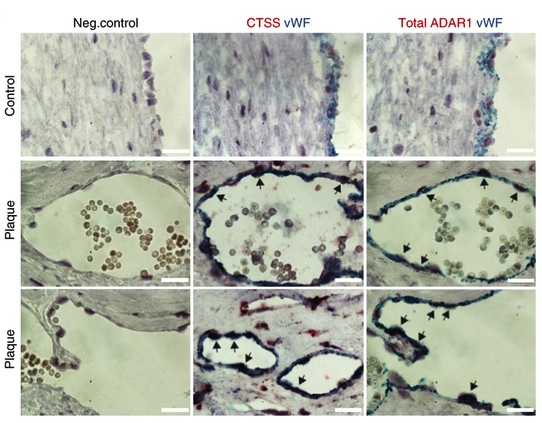Atherosclerotic vascular disease remains the primary cause of mortality and morbidity. Researchers of the Institute for Cardiovascular Regeneration have identified a novel RNA-based mechanism that regulates pro-inflammatory gene expression in atherosclerotic heart disease. Their findings have been published in the Nature Medicine.
The international research team led by Konstantinos Stellos and Stefanie Dimmeler demonstrated an important role of RNA modifications in the regulation of gene expression and endothelial cell function. By using RNA-sequencing and advanced molecular biology techniques, they showed that adenosine deamination in RNA level by ADAR1, a process called adenosine-to-inosine RNA editing, of the extracellular matrix degradation enzyme cathepsin S, an enzyme with a well-established role in the development and prognosis of cardiovascular and tumor disease, alters the RNA-protein interaction controlling cathepsin S mRNA stability and expression in inflammatory vascular diseases.
Taken together, this study reveals a previously unrecognized role of RNA editing in human atherosclerosis.
Article:
Stellos K, Gatsiou A, Stamatelopoulos K, Perisic Matic L, John D, Lunella FF, Jaé N, Rossbach O, Amrhein C, Sigala F, Boon RA, Fürtig B, Manavski Y, You X, Uchida S, Keller T, Boeckel JN, Franco-Cereceda A, Maegdefessel L, Chen W, Schwalbe H, Bindereif A, Eriksson P, Hedin U, Zeiher AM, Dimmeler S. Adenosine-to-inosine RNA editing controls cathepsin S expression in atherosclerosis by enabling HuR-mediated post-transcriptional regulation. Nat Med. 2016 Oct; 22(10):1140-1150.
Link: http://www.nature.com/nm/journal/vaop/ncurrent/full/nm.4172.html

